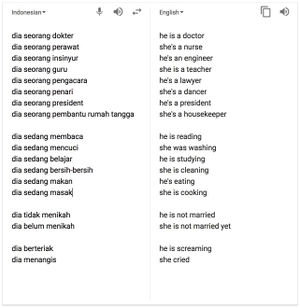User:Tash/Prototyping 01: Difference between revisions
| Line 42: | Line 42: | ||
==Wiki-wiki== | ==Wiki-wiki== | ||
* Learnt how to use media-wiki as a writing and reading platform | * Learnt how to use media-wiki as a writing and reading platform | ||
* Opportunities & challenges in using Semantic Media wiki: how the use of metadata, properties, values and forms can be useful in creating meaning, but also limiting in other ways | * Opportunities & challenges in using Semantic Media wiki: how the use of metadata, properties, values and forms can be useful in creating meaning, but also limiting in other ways. Very interesting to note that an archive's system can determine what it produces | ||
* Wiki skinning with Manetta | * Wiki skinning with Manetta (my experience in web design and html was helpful in this) | ||
* | * Using templates in the media-wiki environment | ||
<source lang="html4strict"> | |||
{{#ask: [[Title::A chair in the Poortgebouw]] | |||
|?Title | |||
|?Document Type | |||
|?Last editor is | |||
|?Modification date | |||
|format=template | |||
|template=image overview | |||
|sort=Modification date | |||
|order=descending | |||
}} | |||
</source> | |||
* Experimented with algorithms and scripts that used the wiki as a source and generated a PDF output via command line | |||
==Going forward== | ==Going forward== | ||
Revision as of 12:38, 11 December 2017
Command lines & Raspberry Pis
- First time ever working with command lines, shell scripts and the Raspberry Pi.
- Made first bash script (using python scripts, ffmpeg, melt, spell and speak)
- Experiment with interaction in scripts
espeak -w audio.wav -p 70 "I am dead inside"
sox audio.wav audio2.wav speed 0.7
sox audio2.wav -b 8 -e unsigned-integer -c 1 -r 4000 -t raw rawfile
rm frame*.jpg
python lip-sync.py
ffmpeg -r 10 -i frame%09d.jpg -i audio2.wav -y mymovie1.mp4
espeak "Hi, What is your name?"
echo "What is your name?"
read content
espeak -z "Nice to meet you"
echo $content | espeak
espeak "What’s your favorite color?"
echo "What’s your favorite color"
read content
espeak -z "Oh my god. I love the color"
echo $content | espeak
- Better understanding of networks, servers & programming languages, setting up public websites on the Pi, like we did for the documentation of our Special Issue 04 project
- First time using Git repositories
Wiki-wiki
- Learnt how to use media-wiki as a writing and reading platform
- Opportunities & challenges in using Semantic Media wiki: how the use of metadata, properties, values and forms can be useful in creating meaning, but also limiting in other ways. Very interesting to note that an archive's system can determine what it produces
- Wiki skinning with Manetta (my experience in web design and html was helpful in this)
- Using templates in the media-wiki environment
{{#ask: [[Title::A chair in the Poortgebouw]]
|?Title
|?Document Type
|?Last editor is
|?Modification date
|format=template
|template=image overview
|sort=Modification date
|order=descending
}}
- Experimented with algorithms and scripts that used the wiki as a source and generated a PDF output via command line
Going forward
- Would love to push my technical skills in the next trimester. This means more coding, python, publishing on different servers, research on networks, but also experiments with hardware.
- Algorithmic curation & generative content is a growing interest for me
- Also: In a publication, where is the border between reader & writer? Wikis are all about collaborative content; they are also 'platforms with attitudes'. How does software influence behaviour? Politics of 'seamlessness'?
- To explore further: language, value systems in software, designing the rules and not the output
- References:
- Eleven Orderings: Guttorm Guttormsgaard http://guttormsgaard.activearchives.org
- 1984 by @realdonaldtrump http://emmaking.net/index.php?/projects/1984-by-realdonaldtrump/
- Editor by NYT Labs


